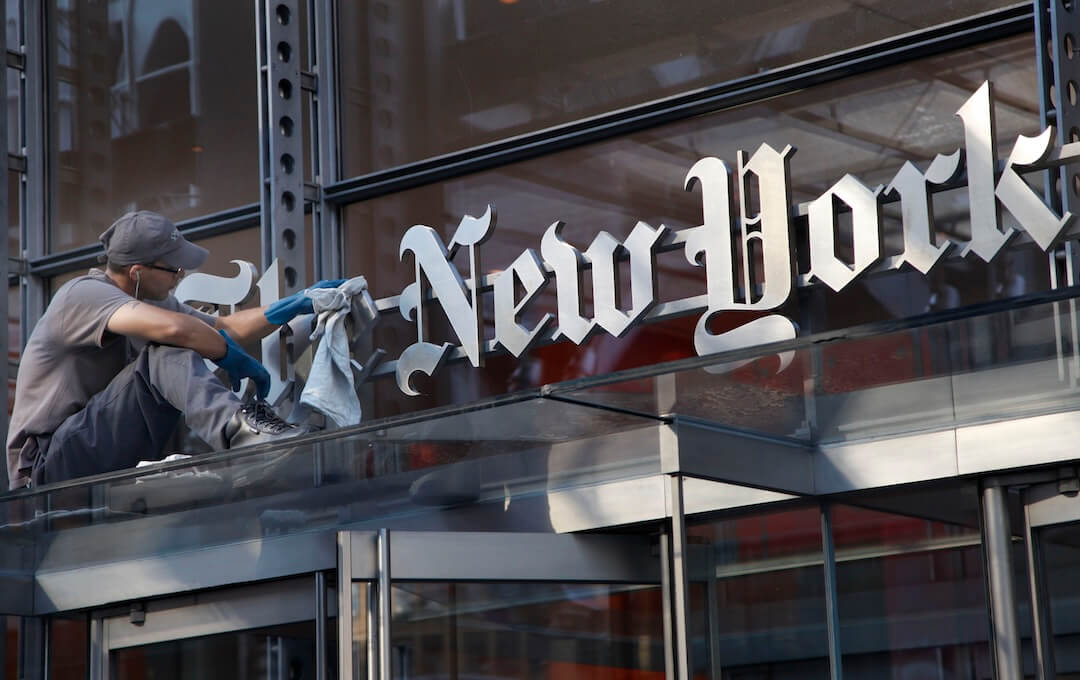This article is part of The Poynter 50, a series reflecting on 50 moments and people that shaped journalism over the past half-century — and continue to influence its future. As Poynter celebrates its 50th anniversary, we examine how the media landscape has evolved and what it means for the next era of news.
For months, Chris Lee and Harriet Ryan of the Los Angeles Times had been deep in coverage of Michael Jackson’s increasingly chaotic world.
The King of Pop’s looming comeback tour — 50 sold-out shows at London’s O2 Arena — was billed as his grand return. But behind the scenes, his life was unraveling. Financial turmoil. Legal battles. Whispers about his health.
“I go through hell touring,” he once admitted in a television special.
And now, at 50, Jackson was facing the biggest test of his career — one that some of his closest observers weren’t sure he could pass.
“He was just in bad shape,” said Lee, at the time an entertainment features reporter for the Times, in an interview with Poynter. “And so there was a lot of doubt around his ability to make a comeback.”
On June 25, 2009, Lee was at work, on deadline for a story, when a colleague gestured toward one of the newsroom’s TVs.
On the screen: A helicopter shot of Jackson’s rented Holmby Hills mansion.
“And it said, ‘TMZ reporting Michael Jackson dead,’” Lee recalled. “This person said to me, ‘TMZ just ruined your day.’”
A digital upstart breaks the story
On TMZ.com, the exclusive’s headline read: “Michael Jackson Dies.”
“We’ve just learned Michael Jackson has died. He was 50,” the story began. “Michael suffered a cardiac arrest earlier this afternoon at his Holmby Hills home and paramedics were unable to revive him. We’re told when paramedics arrived Jackson had no pulse and they never got a pulse back.”
Launched in 2005, TMZ had built a reputation as an aggressive, well-sourced and controversial celebrity news outlet. It sometimes eschewed the norms that bound traditional media.
Harvey Levin, TMZ’s founder, later described the moment his team hit “publish.”
“And pushing that button, you know what it means. And so that is a moment. And you just know that it goes from a little office to around the world. And you stare at that button for a bit.”
It’s widely known that TMZ pays for content. This is at complete odds with the norms of traditional journalists, where paying sources for stories is viewed as unethical. In the case of Jackson’s death, outside reporters assumed TMZ had paid for the tip.
“Once we got confirmation and we knew that it was TMZ, we knew that the game had kind of changed,” Nekesa Mumbi Moody, then the music editor for The Associated Press, told Poynter.
The AP, CNN and most other mainstream outlets hesitated. For more than an hour, TMZ was the only outlet saying that the singer was dead.
“As far as we were concerned, the story was not corroborated just because TMZ reported. Everyone regarded TMZ as squishy,” said Lee, now a senior reporter at New York Magazine and Vulture. “What you saw on CNN, and all the local news broadcasters, was they’re saying ‘TMZ is reporting.’ It’s not ‘Michael Jackson is dead.’ It’s like ‘TMZ is reporting’ at this early stage in the day.”
“Still, the bulletin traversed the Web with remarkable speed,” wrote Brian Stelter in The New York Times, “creating a stark divide: on the Internet Mr. Jackson was dead, and on TV he was still alive.”
The new reality for newsrooms
Over at the Los Angeles Times, a furious scramble began to corroborate what TMZ was reporting about the pop icon.
“You feel it internally at the paper,” Lee said. “You feel like every editor at the building is waiting for you to file. There’s a hole in the paper the size of your story. The city is waiting for the story. The world is waiting for the story.”
Lee launched into a flurry of phone calls — dozens of them to his sources in entertainment. Harriet Ryan, now a Pulitzer Prize-winning investigative reporter at the Los Angeles Times, worked her sources. Longtime reporter Andrew Blankstein worked his own contacts. And a group of other metro reporters upstairs worked their police connections. The Times came at it from every angle.
“And finally, at some point in the early afternoon, I think it was Blankstein, got it confirmed from the LAPD: Michael Jackson’s dead,” Lee recalled. “So the LA Times reports it. It goes online. And then you saw a shift immediately in the national news coverage. It wasn’t ‘TMZ is reporting Michael Jackson is dead.’ It was ‘Michael Jackson is dead’ at that point.”
The article in the Los Angeles Times had four bylines: Lee, Ryan, Blankstein and Scott Gold. The headline: King of Pop is dead at 50.
“Michael Jackson, an incomparable figure in music, dance and culture whose ever-changing face graced the covers of albums that sold more than half a billion copies, died Thursday, shortly after going into cardiac arrest at his rented Holmby Hills mansion. He was 50,” the lede read. “He spent much of his life as one of the most famous people on the planet, and to many, his untimely death felt both unthinkable and, oddly, inevitable.”
“TMZ will forever be the outlet that broke ‘Michael Jackson died,’” Lee said.
But it wasn’t just a story. It was a turning point.
The scoop that changed journalism
TMZ’s scoop of Jackson’s death was more than just a win for that outlet — it was a wake-up call for the media industry.
“That changed the face of journalism, because we were trying to do things the old-fashioned way. We were trying to do things by the book, but we had to compete with these people who weren’t playing by the old rules,” Lee said.
It marked the beginning of a new era, one where speed, access and aggressive digital reporting could outmaneuver even the top legacy newsrooms.
“They were the upstart digital news service that was kicking everyone’s ass in LA when it came to celebrity news,” Lee said. “It seemed like they were everywhere that we wanted to be first, everywhere that the LA Times wanted to be first.”
TMZ’s model — relentless, well-sourced and unconcerned with legacy journalism’s ethical guardrails — reshaped expectations for breaking news. It forced traditional newsrooms to rethink their approach, not just in entertainment journalism but across all beats.
TMZ is rarely wrong, Moody said, though they have made mistakes over the years. What’s changed, she’s noticed, is that it’s now routine for other outlets to cite TMZ, or at least acknowledge when the website breaks a story first.
By beating legacy media to one of the biggest news stories of the decade, TMZ proved that digital-first platforms weren’t just challengers but legitimate rivals. The old hierarchy of news had been upended, and breaking news would never be the same.







